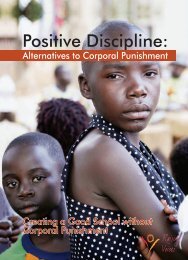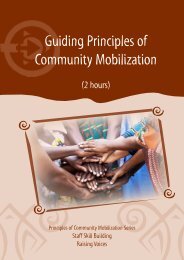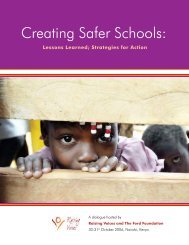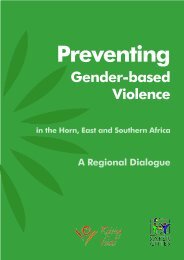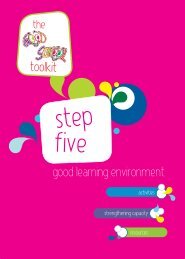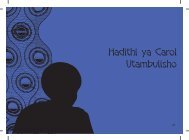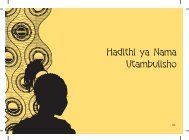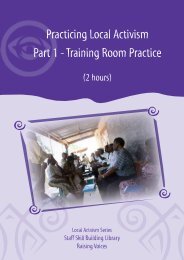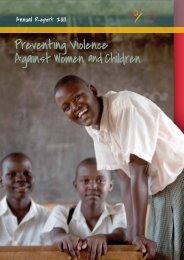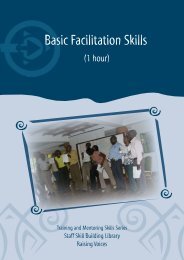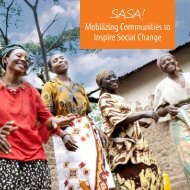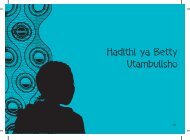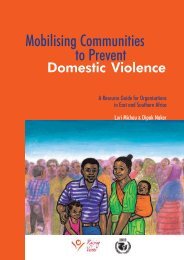Violence against children, the voices of Ugandan ... - Raising Voices
Violence against children, the voices of Ugandan ... - Raising Voices
Violence against children, the voices of Ugandan ... - Raising Voices
You also want an ePaper? Increase the reach of your titles
YUMPU automatically turns print PDFs into web optimized ePapers that Google loves.
QUESTION 7How do you feel when violence is committed <strong>against</strong> you?Children’s response to this question was overwhelming. The question elicited powerful and animatedresponses and revealed reactions to violence that spanned a broad spectrum <strong>of</strong> emotions including fury, rage,bitterness and resignation. Many <strong>children</strong> felt that adults did not give due weight to <strong>the</strong> depth <strong>of</strong> <strong>the</strong>ir feelingsand felt frustrated by how seldom anyone would understand <strong>the</strong>ir reaction. Most <strong>of</strong> <strong>the</strong> time, <strong>children</strong> seemedunresolved about what to do with <strong>the</strong>ir feelings.I feel like my heart will explode if I start saying how I feel about her. She treats me worse than ananimal and <strong>the</strong>re is nothing I can do about it. I feel like running away and becoming a prostitute.14-year-old girl, KaseseMost <strong>children</strong> (66.7 percent) reported feeling “anger.” In focus group discussions, many <strong>children</strong> talked aboutfeeling indignation followed by despair regarding <strong>the</strong> powerless situation in which <strong>the</strong>y found <strong>the</strong>mselves.Children <strong>of</strong>ten reported that <strong>the</strong>y did not understand or accept <strong>the</strong> logic <strong>of</strong> <strong>the</strong> punishment, that adultsignored <strong>the</strong>ir pleas to be taken seriously, to engage in a dialogue, or to receive an explanation as to why <strong>the</strong>ywere being treated in that manner. Many <strong>children</strong> learned from such transactions that a person with morepower does not have to be accountable.The second most common response (65.9 percent) was “fear.” Many <strong>children</strong> reported that <strong>the</strong>y lived inperpetual fear <strong>of</strong> <strong>the</strong> adults around <strong>the</strong>m. They learned that fearing adults was <strong>the</strong> safest way <strong>of</strong> avoidingviolence, and, as a result, <strong>the</strong>ycreated relationships <strong>of</strong> complianceand obedience ra<strong>the</strong>r than mutualaffection. A higher percentage<strong>of</strong> older and in-school <strong>children</strong>reported fearing adults around<strong>the</strong>m, compared to <strong>the</strong>ir youngerand out-<strong>of</strong>-school counterparts. Thisdifference could suggest that adultsuse fear as a tool for asserting <strong>the</strong>irauthority, especially in schools orin situations where <strong>the</strong>y feel <strong>the</strong>ircontrol over <strong>children</strong> could beundermined.Figure 2.15 Types <strong>of</strong> feelings <strong>children</strong> have when experiencingviolenceAngry at <strong>the</strong> personScared <strong>of</strong> <strong>the</strong> personAshamed <strong>of</strong> myselfWant to take revengeO<strong>the</strong>r (ignore, forgive)Don’t know0 2040 6080% <strong>of</strong> respondents38 Part Two Children’s Experiences



